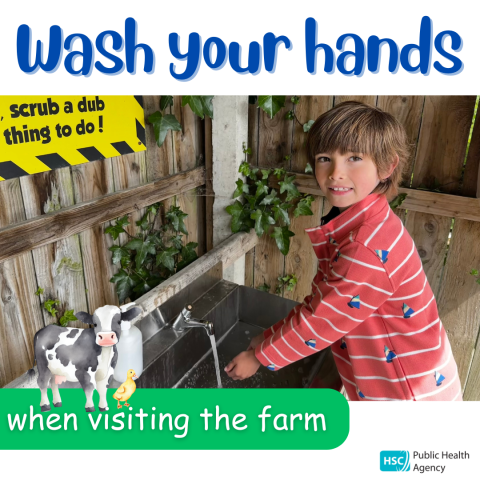World Hand Hygiene - wash your hands when on days out with the family

The Public Health Agency (PHA) is reminding everyone ahead of World Hand Hygiene Day on the 5 May of the need to wash their hands thoroughly and regularly on days out with the family.
Caroline McGeary, Infection Prevention and Control Lead Nurse at the PHA, said: “The spring and summer months are filled with days out with the family, but we want people to have pleasant memories, so it’s important for the whole family to practise good personal hygiene by washing their hands frequently and thoroughly with soap and hot running water when out and about.
“All animals naturally carry a range of organisms, some of which can be transmitted to humans and can potentially cause severe infection, particularly in young children. For example, Shiga toxin-producing Escherichia coli (STEC) and cryptosporidium are easily passed from animals to children, and symptoms include vomiting, abdominal cramps and diarrhoea.
“Cryptosporidium is another organism which causes an infection of the gastrointestinal tract. Symptoms include vomiting, abdominal cramps and watery diarrhoea. Cryptosporidium is a leading cause of infectious diarrhoea in humans in the UK and can occur through contaminated recreational waters, including swimming pools.”
To reduce the risk of illness, all adults and children should follow some simple steps to ensure a fun day out:
Advice for visits to the farm:
- Wash hands thoroughly using soap and water and dry thoroughly with paper towels after handling animals or touching surfaces at the farm.
- Hands should always be washed before eating or drinking and after using the toilet.
Advice for swimmers:
- Don't swim when you have diarrhoea or have had diarrhoea within the past 48 hours.
- Take a shower before swimming
- Wash your hands after using the toilet or changing nappies.
- Please ensure babies and children wear purpose-made swimming nappies and take your child on bathroom breaks.
- Do not swallow water.
Antibacterial hand gels and wipes are not a substitute for washing hands, as gels and wipes may not adequately remove germs and bugs in the way that soap and running water can. However, using such gels after hand washing with soap and water may reduce the risk of picking up these infections.
“A responsible adult should always supervise children’s personal hygiene to make sure it is carried out properly. By being aware and by taking some simple steps, we can all help to avoid illness and enjoy a fun day out,” concluded Caroline McGeary.
